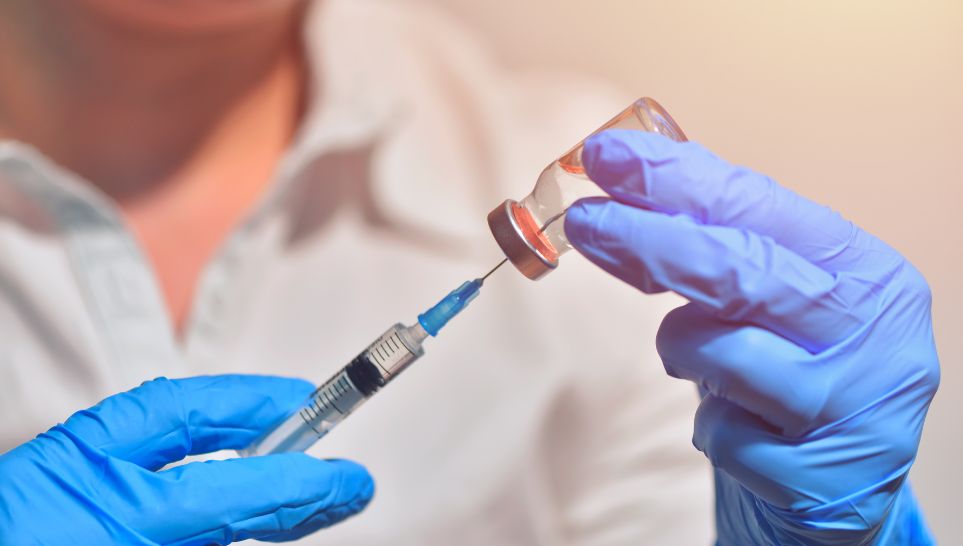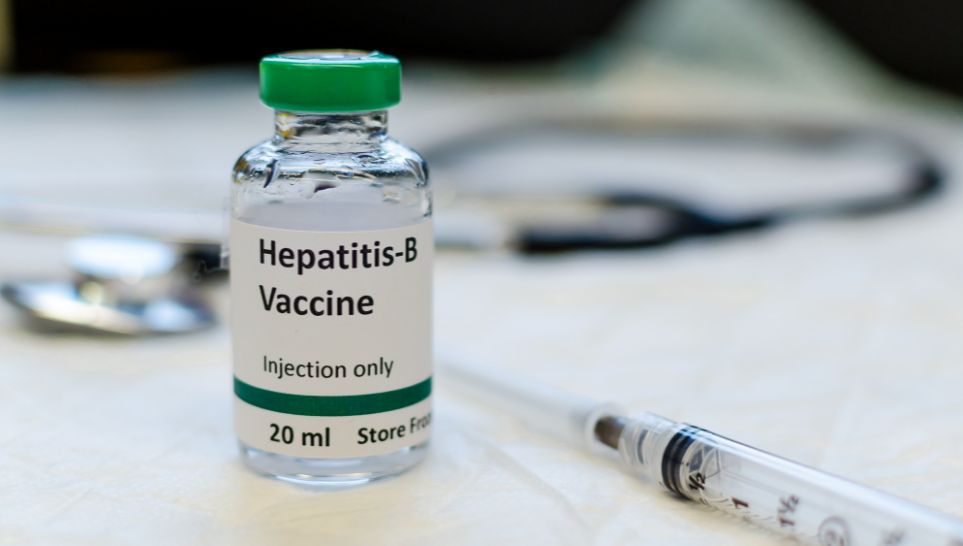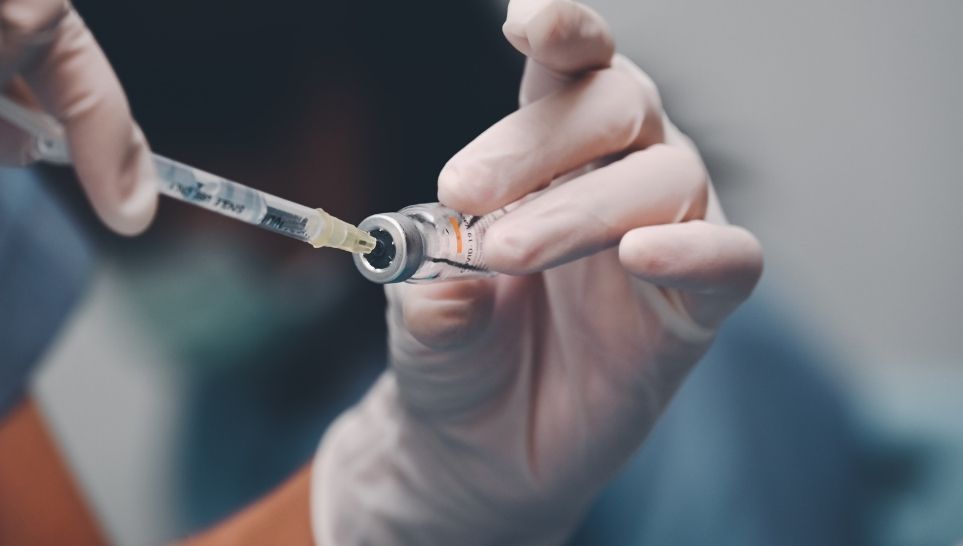While it is uncommon for most people to faint after a vaccination, it is one of a few adverse reactions that can happen after receiving a flu shot. The medical term for fainting, “vasovagal syncope,” describes a rapid decline in blood pressure due to a reduced heart rate and dilated blood vessels.
Fainting after a flu shot can lead to other injuries due to the loss of body control, including fall injuries. Fainting can also sometimes look similar to a seizure, potentially leading to a misdiagnosis of a seizure condition. But what causes some people to have such reactions to a flu shot in the first place?
What Is It?

Syncope (fainting) usually has a trigger, such as anxiety or pain. Among those who faint after a vaccination, 62% are adolescents between 11 and 18 years old, according to a study of reports in the Vaccine Adverse Event Reporting System (VAERS).
Younger children and adults sometimes also faint after a vaccination. While fainting after a flu shot can occur, the most common vaccines associated with fainting are the HPV vaccine, the Tdap vaccine, and the MCV4 vaccine, all of which are typically administered during adolescence. Because the ingredients in each vaccine are different, experts believe the administration of the injection and not the vaccine itself causes syncope.
If a patient experiences fainting after a flu shot and isn’t sitting or lying down, they could experience additional injuries from falling. Vaccine administrators should have patients sit down and observe them for 15 minutes after a vaccination to look for signs of adverse reactions, including fainting.
Some fainting episodes can resemble seizures due to muscle spasms that occur while the patient is unconscious. Doctors and practitioners administering vaccines should ask about a patient’s seizure history before the injection, as vasovagal responses can also lead to seizure incidents.
Causes and Mechanism
Nervousness about an injection may cause a patient to experience a rapid drop in blood pressure that could lead to fainting. Even if a patient doesn’t feel nervous, their body can express their hidden anxiety by hyperventilating, causing high levels of carbon dioxide in the brain that can cause them to faint.
But do vaccines cause patients to faint? Many experts believe it is the method of injection rather than the vaccine ingredients leading to vasovagal syncope. While the instances are higher for HPV, MCV4, and Tdap vaccines, these vaccines are often administered during adolescence, when patients are more susceptible to fainting.
Reporting shows that 3% of men experience at least one fainting incident in their lifetime, while 3.5% of women faint at least one time. However, it is unknown how many incidents occur due to vaccinations. Fainting may be underreported to the Vaccine Adverse Event Reporting System, making it difficult to track through medical records alone.
Fainting generally does not leave lasting effects unless a patient suffers an injury due to falling. Collecting data for vasovagal syncope relies on doctor-reported or self-reported incidents to the VAERS.
Common Symptoms

If you have a fear of needles, anxiety about an injection could cause you to hyperventilate or experience sudden changes in blood pressure. While fainting after a flu shot or other vaccine injection is rare, some patients experience fainting as an adverse reaction. Symptoms of syncope include:
- Feeling warm
- Lightheadedness
- Blurred vision
- Tunnel vision or narrowing vision
- Pale skin
- Clamminess or cold sweat
- Yawning
- Nausea
If you feel any of these conditions after an injection or vaccine, sit down and try to stay away from any structures that might cause more harm if you fall. Remain seated or lying down until the symptoms subside, as standing up again too soon can cause you to experience a recurring episode.
Sometimes, fainting leads to muscle spasms that cause jerky motions that a practitioner should not mistake for a seizure in most patients. Because these movements can resemble a seizure, patients prone to seizures or diagnosed with epilepsy should be observed for signs of fainting or seizure after a vaccination.
Risk Factors
Are some patients more likely to experience fainting than others? Some additional risk factors may increase the likelihood of fainting after a vaccination, including:
- Injection anxiety (fear of getting a shot)
- Dehydration
- Low blood sugar
- Standing for extended periods before or after receiving the injection
- Fatigue or stress
- Prolonged exposure to heat
Having unmanaged health conditions like diabetes or high blood pressure may also increase your risk of fainting after an injection.
Prevention and Precautions

If you’re nervous about an upcoming vaccine and you have fainted after a vaccine or have an increased risk of fainting, be sure to speak with your doctor about your concerns. To reduce the risk of fainting after your vaccine, take the following steps to make yourself more comfortable:
- Drink a full glass of water before the injection, and have a bottle of water with you in the office or lab site to stay hydrated.
- Sit before, during, and after the injection, or lie down if you feel fatigued or off-balance.
- Take slow, steady breaths to prevent a buildup of carbon dioxide in your system.
- Wear loose-fitting layers of clothing so you can remove layers if you start feeling too warm.
- Avoid getting overheated before your injection.
It’s important to prevent fainting after an injection as much as possible, as fainting episodes can lead to falls. Falling can be incredibly dangerous, leading to broken bones, head trauma, and soft tissue injuries, even at the same level.
Dealing With Post-Injection Anxiety
If you recently suffered a fainting episode after receiving a vaccination, consider your next steps to deal with anxiety before your next injection. Before your next vaccine, you can:
- Discuss your concerns with your doctor
- Practice meditation or breathing exercises to stay calm
- Bring a family member or friend with you for your vaccination
- Dress comfortably for your appointment
- Eat a snack and drink water to avoid low blood sugar and dehydration
Injuries and Complications
Fainting after a flu shot or other vaccine can lead to injuries if you fall. Common fall injuries after fainting include:
- Bruises from the floor or solid surfaces
- Cuts from sharp edges or furniture corners
- Broken bones, especially wrists, hands, or elbows
- Head injuries from striking objects or the floor
- Injury at the injection site from the needle
- Muscle strains or soft tissue injuries from sudden spasms or contractions
Taking the appropriate steps to prevent falls in the event of fainting during or after an injection is key to avoiding or reducing injuries due to vasovagal syncope.
Injured by a Flu Vaccine? Turn to Sadaka Law
Fainting after a flu shot is just one way patients can suffer injury from the flu vaccine. In rare cases, the flu vaccine may also cause more severe conditions, including traverse myelitis, neuromyelitis optica (NMO), acute disseminated encephalomyelitis (ADEM), and brachial neuritis, among other severe conditions. However, flu vaccination injuries are rare, and very few people need to avoid getting the vaccine.
For help with any injury caused by the flu vaccine, contact our experienced vaccine injury attorneys at Sadaka Law. Call us today at 800-810-4139 or contact us online to schedule a consultation with our legal team for yourself or your minor child.






